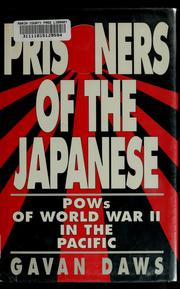Check nearby libraries
Buy this book

In the first disastrous months following Pearl Harbor, the Japanese Army took over 140,000 Allied prisoners. More than one in four of these POWs died at the hands of their captors. They were denied medical treatment. They were starved. When the International Red Cross sent food and medicine, the Japanese looted the shipments. They sacrificed prisoners in medical experiments. They watched them die by the tens of thousands from diseases of malnutrition like beriberi, pellagra, and scurvy, and from the epidemic diseases of the tropics: malaria, dysentery, tropical ulcers, and cholera. Those who survived were slated to be worked to death. If the war had lasted another twelve months, there would not have been a POW left alive.
Prisoners of the Japanese raises disturbing questions as well about the value placed on the lives of Allied POWs by their own supreme command. Of all military prisoners who died in the Japanese zone of captivity, more than one in four were killed by "friendly fire" ordered by General Douglas MacArthur. It is impossible not to be seized by the horror of the POWs' ordeal. But while the inhuman cruelty of the Japanese prison camps is documented exhaustively - beyond the shadow of a doubt - the book, at its core, tells a heartening story of ordinary men, trapped in impossible circumstances, not only struggling to survive but stubbornly, triumphantly asserting their humanity.
Check nearby libraries
Buy this book

Previews available in: English
Subjects
Prisoners of war, Geallieerden, World War, 1939-1945, Krijgsgevangenen, Kriegsgefangener, Weltkrieg (1939-1945), Tweede Wereldoorlog, History, Japanese Prisoners and prisons, New York Times reviewed, World war, 1939-1945, prisoners and prisons, japanesePlaces
Japan, Pacific Area, Pazifischer RaumTimes
20th century| Edition | Availability |
|---|---|
|
1
Prisoners of the Japanese: POWs of World War II in the Pacific
2006-01-01, SIMON & SCHUSTER LTD
074328528X 9780743285285
|
zzzz
Libraries near you:
WorldCat
|
|
2
Prisoners of the Japanese: POWs of World WarII in the Pacific : the powerful untold story
1995, Robson
in English
0860519783 9780860519782
|
cccc
Libraries near you:
WorldCat
|
|
3
Prisoners of the Japanese: POWs of World War II in the Pacific
1994, W. Morrow
in English
- 1st ed.
0688118127 9780688118129
|
aaaa
Libraries near you:
WorldCat
|
|
4
Prisoners of the Japanese: POWs of World War II in the Pacific
1994, W. Morrow
in English
- 1st ed.
0688118127 9780688118129
|
eeee
Libraries near you:
WorldCat
|
Book Details
Edition Notes
Map on lining paper.
Includes bibliographical references (p. 407-441) and index.
Classifications
The Physical Object
ID Numbers
Work Description
In the first disastrous months following Pearl Harbor, the Japanese Army took over 140,000 Allied prisoners. More than one in four of these POWs died at the hands of their captors.
They were denied medical treatment. They were starved. When the International Red Cross sent food and medicine, the Japanese looted the shipments. They sacrificed prisoners in medical experiments. They watched them die by the tens of thousands from diseases of malnutrition like beriberi, pellagra, and scurvy, and from the epidemic diseases of the tropics: malaria, dysentery, tropical ulcers, and cholera. Those who survived were slated to be worked to death.
If the war had lasted another twelve months, there would not have been a POW left alive. Prisoners of the Japanese raises disturbing questions as well about the value placed on the lives of Allied POWs by their own supreme command. Of all military prisoners who died in the Japanese zone of captivity, more than one in four were killed by "friendly fire" ordered by General Douglas MacArthur.
It is impossible not to be seized by the horror of the POWs' ordeal. But while the inhuman cruelty of the Japanese prison camps is documented exhaustively - beyond the shadow of a doubt - the book, at its core, tells a heartening story of ordinary men, trapped in impossible circumstances, not only struggling to survive but stubbornly, triumphantly asserting their humanity.
Links outside Open Library
Community Reviews (0)
Feedback?History
- Created July 6, 2011
- 3 revisions
Wikipedia citation
×CloseCopy and paste this code into your Wikipedia page. Need help?
| July 22, 2019 | Edited by MARC Bot | remove fake subjects |
| August 12, 2011 | Edited by ImportBot | add ia_box_id to scanned books |
| July 6, 2011 | Created by ImportBot | Imported from Internet Archive item record |













